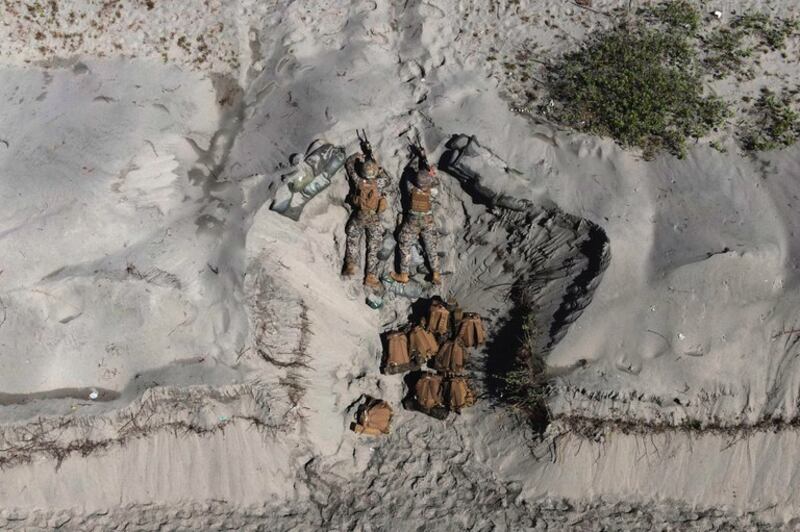The Philippines and Japan will hold an inaugural four-way meeting of their foreign and defense ministers later this week to deepen bilateral security cooperation, Manila confirmed on Tuesday.
The two-plus-two talks, which will consist of two ministers from each side sitting together in the same room, could include discussions on maritime security and the countries' respective territorial disputes with Beijing in the East China Sea and South China Sea. The meeting, agreed to by Philippine President Rodrigo Duterte and Japanese Prime Minister Fumio Kishida in November, is scheduled for Saturday in Tokyo, the Philippine Department of Foreign Affairs (DFA) said in a statement.
“The 2+2 is the next logical progression in the deepening policy and security cooperation between the two countries and is envisioned to be a key component in further strengthening the decade-old PH-Japan Strategic Partnership,” it said.
“The close ties between the two countries for six decades now continue to expand to various areas of cooperation and have resulted in the improvement of the Philippines’ maritime law enforcement capabilities, increased maritime domain awareness and enhanced counterterrorism and humanitarian assistance and disaster relief capabilities, among other areas,” the department said.
While it did not mention any specific topics for discussion, the department said the meeting was to lay the groundwork for a “security partnership in the next decade.”
Foreign Secretary Teodoro Locsin Jr. and Defense Secretary Delfin Lorenzana plan to discuss with their Japanese counterparts ways of working together “amidst the growing complexity in the regional and international security environment,” the department said.
Last week, Kyodo News Agency said Japanese and Philippine ministers were expected to discuss arms exports to the Philippines. It also said Tokyo planned to hold similar discussions with New Delhi later this month.
Tokyo’s plans for the two-plus-two talks “could send a nuanced message to Beijing about Japan’s determination to foster security ties with like-minded partners,” an analyst said last week.
“If Japan could bring the Philippines and India on board for maritime deterrence, it will be a big deal,” Huynh Tam Sang, an analyst at Ho Chi Minh City University of Social Sciences and Humanities in Vietnam, told RFA.
South China Sea claims

Beijing has overlapping claims with Manila in the South China Sea while four other Asian governments – Brunei, Malaysia, Taiwan and Vietnam – also claim territories in the waterway.
Still, China holds the most expansive claim, saying it has “sovereign rights and jurisdiction” over nearly all of the South China Sea.
While Japan is not a claimant, it is a strategic rival of China. The two powers have competing claims in the East China Sea, including the Tokyo-administered Senkaku Islands, which Beijing claims and calls Diaoyu.
China and the Philippines
The Philippines-Japan two-plus-two meeting will also occur the day after a scheduled virtual meeting between Duterte and Chinese leader Xi Jinping. The Philippine foreign ministry has not yet released details of what is to be discussed then.
“Xi Jinping wants to talk to me. We are friends,” Duterte said, according to a transcript released last week announcing the meeting.
Meanwhile on Sunday, Chinese Foreign Minister Wang Yi hosted Locsin for talks in Tunxi, a district in China’s Anhui province.
Chinese and Philippine officials said "maritime issues should be put in a proper place in bilateral relations," according to a statement issued by the Chinese foreign ministry after Sunday's talks.
Wang said Manila and Beijing “should eliminate interference and calmly and properly manage differences, so as to prevent the overall China-Philippines relations from being affected.”
In the meantime, Filipino and U.S. forces have been conducting their largest joint military exercises in years on Philippine territory. The Balikatan (“Shoulder-to-Shoulder”) exercises began on March 28 and go till April 8.
On Tuesday, Lorenzana told reporters that a Chinese ship that had entered Manila-claimed waters in January was “shadowing” another military exercise involving Philippine and American forces.
“The area where the Chinese ship passed is not international waters. ... It is the waters between Palawan and Mindanao,” Lorenzana said, referring to the country’s islands in the west and south.
On March 14, the foreign affairs department said it had summoned Beijing’s envoy, Huang Xilian, over the alleged incursion of a Chinese Navy electronic reconnaissance ship from Jan. 29 to Feb. 1.
“What the ship did was shadow the ongoing exercises with the U.S. forces, U.S. Navy, that we were having,” Lorenzana said, referring to a joint exercise near Palawan from Jan. 28 to 31.
“The exact military term is shadowing. In Intel, that is following and watching,” he said. “[I]t stayed in the area for several days, shadowing the exercise which contradicts the Chinese claim of innocent passage.”
BenarNews is an RFA-affiliated news service.
